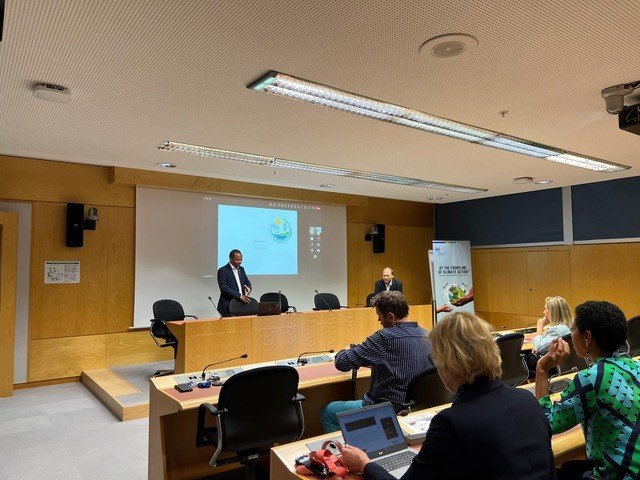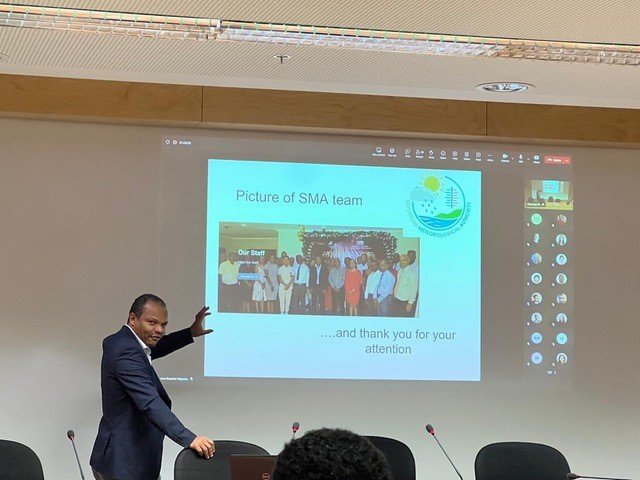Permanent Representative of Seychelles with WMO was the invited keynote speaker at a Lunchtime learning event at WMO
On 17 October 2024, the Permanent Representative of the Republic of Seychelles with the World Meteorological Organization (WMO), Mr Vincent Amelie, was the invited keynote speaker at a lunchtime learning event at the organization's headquarters in Geneva. This event counted with the participation of WMO staff from various programmes and projects managed by WMO.

During the event, Mr Amelie provided a brief history of the meteorological activities in the Republic of Seychelles that dated back to January 1880. He noted that with the opening of Seychelles International Airport in July 1971, aeronautical weather services commenced to be provided in line with standards established by the International Civil Aviation Organization (ICAO). Mr Amelie explained that for many years, aeronautical meteorology was considered the major priority. In this context, a Quality Management System (QMS) was set up, leading to ISO 9001:2015 certification in 2021 and cost recovery in 2022. He further explained that significant investments were required, including recruitment of skilled expats to carry out key functions required to provide aeronautical meteorological services. A localization plan was developed for the forecasting positions, to ensure that expats are replaced by Seychellois by 2030.
Mr Amelie noted that the Meteorology Act 2015 established the Seychelles Meteorological Authority (SMA), which is administered by a Board and managed by a Chief Executive Officer (CEO). Since then, SMA has expanded its mandate by providing other products and services underpinned by a diversified observation network, forecasting tools and dissemination of services e.g. through its media studio. Mr Amelie explained that a number of projects have been initiated to support the modernization and expansion of SMA, however these have been established in an independent and non-concertized way. He stressed the importance of a strong leadership is required to define a strategic pathway to deal with these various initiatives. With the support of the Climate and Risk Early Warning Systems (CREWS) initiative for the Southwest Indian Ocean (SWIO), he defined the strategic goals and objectives, alongside with the required activities, for 2025-2029, which will take SMA to the next level of its development to ensure it contributes to the National Development Strategy 2024 – 2028. Mr Amelie also informed that aligned with this new SMA Strategic Plan, a review of the Meteorology Act is ongoing, work on the Human Resource structure, development of a Training Programme and the in-house implementation of a Competency Assessment framework have been initiated.

Finally, Mr Amelie emphasized the need for strong leadership and commitment of the Permanent Representative of Seychelles with WMO (which is no longer the same) to address the needs associated with climate change and hydromet extreme events, while considering the rapid changes in social conditions and evolving requirements, and the dramatic advances in science and technology. He also stressed the need to think regionally rather than nationally, and highlighted the importance of having strong regional centres and of innovation.
The WMO Secretary-General and the staff congratulated Mr Amelie for this commitment, strong leadership, passion and enthusiasm towards developing SMA to support societal development and economic growth in Seychelles.

